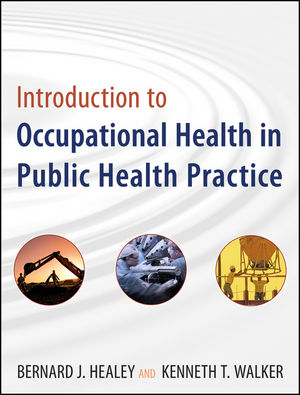|
Textbook
Introduction to Occupational Health in Public Health PracticeISBN: 978-0-470-44768-0
Paperback
352 pages
September 2009, ©2009, Jossey-Bass
 |
||||||
Figures, Tables, and Exhibits xi
Introduction xv
Acknowledgments xix
The Authors xxi
The Contributors xxiii
Part One Public Health Prevention Focus 1
1 History and Importance of Public Health 3
A Brief History of U.S. Public Health 4
Healthy People 2010 8
Responsibilities of Public Health 11
Public Health Accomplishments 11
Emphasis on Prevention Not Control 14
Public Health and Occupational Health 16
Summary 25
Key Terms 25
Questions for Discussion 25
2 Epidemiology of Occupational Safety and Health 27
Introduction to Epidemiology 28
Surveillance Systems 31
Epidemiology Studies 33
Health Hazard Evaluations 35
Public Health Systems in the Workplace 37
Chronic Disease Epidemiology in the Workplace 38
Summary 39
Key Terms 39
Questions for Discussion 39
Part Two Occupational Safety and Health 41
3 History and Importance of Occupational Safety and Health 43
Health, Disease, and Prevention 48
The Role for Public Health 51
Summary 54
Key Terms 55
Questions for Discussion 55
4 Occupational Injuries 57
Epidemiology of Injuries 58
The Case for an Epidemiological Approach 59
Epidemiology of Accidents 66
Epidemiology of Violence 68
Surveillance Systems for Occupational Injuries 69
Surveillance Results 70
Injury Prevention Programs 73
Future Challenges 77
Summary 78
Key Terms 80
Questions for Discussion 80
5 Compliance versus Prevention 81
OSHA Standards Development 84
The Inspection Process 88
Compliance or Prevention 90
Prevention of Cumulative Problems 93
Summary 93
Key Terms 93
Questions for Discussion 93
Part Three Public Health Issues in Occupational Safety and Health 95
6 Toxicology 97
Application to Occupational Epidemiology 98
Subdisciplines in Toxicology 99
Classification of Toxic Agents 100
Environmental Tobacco Smoke 103
Risk Assessment 104
Toxicology Case Studies 105
Toxin Regulation and Research 105
Summary 108
Key Terms 109
Questions for Discussion 109
7 Stress 111
Stress Basics 112
Workplace Characteristics and Stress 116
Organizational Response to Stress 117
When to Get Help 122
Summary 122
Key Terms 122
Questions for Discussion 123
8 The Impaired Employee 125
Drug Use Frequency and Demographics 127
Epidemiology of Addiction 129
Substances Often Abused 134
Drug-Free Workplaces and EAPs 136
Summary 140
Key Terms 140
Questions for Discussion 141
9 Wellness Programs 143
Chronic Diseases in the Workplace 145
The Value of Wellness Programs 146
Addressing Obesity and Nutrition 147
Addressing Physical Inactivity 151
Addressing Tobacco Use 153
Developing Comprehensive Health Programs 155
The Role for Public Health 157
Summary 159
Key Terms 160
Questions for Discussion 160
10 Emergency Response Planning 161
Definitions 162
Emergency Management Planning Steps 162
Terrorism and Bioterrorism 164
Workplace Preparedness for Terrorism 167
CDC’s Strategic Workplace Plan 168
Applying Epidemiology to Preparedness 168
Applying an Information Model to Preparedness 174
Involving OSHA and NIOSH in Planning 175
Summary 176
Key Terms 177
Questions for Discussion 177
11 Ergonomics 179
Two Approaches: Broad and Narrow 181
Ergonomists’ Roles and Experience 187
Few Absolute Limits 188
Cumulative Trauma Disorders 189
The Industrial Athlete 195
Summary 198
Key Terms 198
Questions for Discussion 198
12 Communicable Diseases 199
Epidemiology of Communicable Diseases 200
Foodborne and Waterborne Diseases 202
Tuberculosis 203
Hepatitis 204
HIV and AIDS 207
Influenza 208
Emerging Infections 209
Summary 213
Key Terms 213
Questions for Discussion 214
13 Vision and Hearing Issues 215
Protecting Vision in the Workplace 216
Protecting Hearing in the Workplace 223
Summary 231
Key Terms 232
Questions for Discussion 232
14 Occupational Health Disparities 233
Disparate Populations 234
How Do Health Disparities Persist? 251
Future Trends in Health Disparities 256
Summary 257
Key Terms 258
Questions for Discussion 258
Part Four Evaluation and Leadership Issues in Prevention 259
15 Economic Impacts of Prevention 261
Premature Mortality 262
Employer Health Insurance Costs 262
The Purposes of Economic Evaluation 264
The Burden of Injury and Illness 264
Types of Economic Analysis 266
Target Areas for Evaluation 268
Summary 276
Key Terms 277
Questions for Discussion 277
16 Impacts of Leadership and Culture 279
Using Vision and Management Skills 282
Using Power Effectively 284
Exercising Transformational Leadership 286
Changing the Process of Work 287
Motivating Employees 287
Building a Culture 288
Empowering Workers 290
Improving Team Effectiveness 291
Summary 292
Key Terms 292
Questions for Discussion 292
References 293
Index 313



